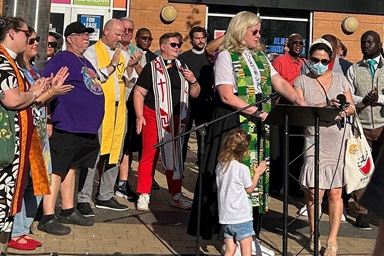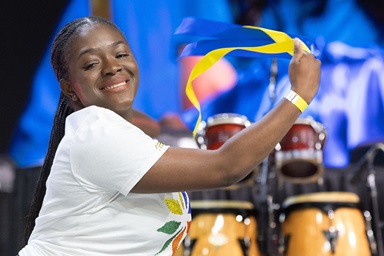The pandemic’s economic wreckage has left its mark on United Methodist ledgers.
However, giving to denomination-wide ministries rebounded slightly in July.
In an Aug. 27 online meeting, General Council on Finance and Administration board members heard an update on general church finances in the wake of COVID-19. They also received some guidance on calculating online attendance while the disease’s spread still keeps many people worshipping at home.
July saw the highest apportionment collections of any month so far this year. U.S. conferences remitted about $9 million to general church ministries — up 4% from the same month last year.
“It’s the first time we’ve been ahead of the prior year all year long. That is encouraging,” Rick King, GCFA’s chief financial officer, told the board. “So far in August, we’re seeing maybe not quite as much as an uptick as July — but much better than we were in April and May.”
Nevertheless, the U.S. collection rate is down overall compared with the same period in 2019 — to the tune of about $10.3 million. Collections from central conferences — church regions in Africa, Europe and the Philippines — also are down overall this year by about $53,000. The U.S. church provides 99% of the funding for general church ministries.
General counsel named
The General Council on Finance and Administration board on Aug. 27 elected Bryan Mills as its general counsel. Mills had been serving as interim general counsel since August 2019 when his predecessor, the late Steve Lambert, retired.
Mills has served with GCFA’s legal services department since 2009. He now leads the team responsible for safeguarding the legal interests of the denomination.
That includes maintaining a file of legal briefs related to cases involving the denominational interests of The United Methodist Church. It also includes recommending uniform procedures for clergy housing allowances and taking steps to preserve the tax-exempt status of the denomination's constituent organizations.
His office supervises the use of the official United Methodist insignia, the Cross and Flame, and maintains registrations of the name “United Methodist.
Mills has served with GCFA’s legal services department since 2009. He now leads the team responsible for safeguarding the legal interests of the denomination.
That includes maintaining a file of legal briefs related to cases involving the denominational interests of The United Methodist Church. It also includes recommending uniform procedures for clergy housing allowances and taking steps to preserve the tax-exempt status of the denomination's constituent organizations.
His office supervises the use of the official United Methodist insignia, the Cross and Flame, and maintains registrations of the name “United Methodist.
General church apportionments support the work of most general agencies as well as bishops, general administration, ministerial education and denomination-wide efforts such as the Black College Fund, ecumenical work and Africa University in Zimbabwe.
Conferences, too, have experienced drops in giving amid the pandemic. Many have taken steps to make sure more funds remain with churches, which no longer can pass around the offering plate in these socially distanced times.
Some conferences, such as Arkansas, waived church apportionments for a month or more. Others, such as the Baltimore-Washington and North Georgia conferences, covered the costs of local churches' benefit obligations.
Agencies and conferences are dipping into reserves to make up some of the shortfalls.
Also offsetting some of the decline in apportionments are loans through the U.S. Paycheck Protection Program. The U.S. Coronavirus Aid, Relief and Economic Security — or CARES Act — created the program with the aim of enabling small businesses and nonprofits to keep workers paid during pandemic-related challenges.
The U.S. Small Business Administration has stipulated that loans can be forgivable — essentially becoming grants — if recipients maintain the number of people on their payroll as before the crisis and meet other restrictions.
A UM News analysis found that at least 751 United Methodist organizations, including churches, conferences, seminaries and other ministries, have received between $150,000 and $5 million in Paycheck Protection Program loans.
With the GCFA board’s authorization, nine general church agencies received a total of about $7.9 million in loans. Five of those agencies, including the finance agency itself, have since received loan forgiveness, while four other agencies are still waiting for confirmation.
While the pandemic has strained ministries across the denomination, many churches have reported one bright spot — higher viewership of their online worship services than their usual in-person attendance.
GCFA, which collects the denomination’s membership and attendance data, has received requests for guidance on counting online worship.
“It was recognized that consistency in tracking is important, and concerns were raised regarding accuracy in reporting of attendance statistics for 2020 across the denomination,” Per-Endre Bjørnevik, chair of GCFA’s Connectional Outreach Committee, told the board.
The agency’s data services staff plans to continue reviewing best practices. But in the meantime, the board received some guidance from Naomi Annandale, director of research and strategic evaluation with Discipleship Ministries.
“Numbers represent people and people matter,” Annandale wrote in her report. “Every person who watches on YouTube, participates on Zoom, messages on Facebook Live is a child of God. They matter, and it matters that your church has given them a way to worship in a challenging time.”
She urges churches to first check with their conferences to see what policies they have for tracking online attendance.
Several conferences advise counting only viewers who stay with a service for a specified length of time, Annandale wrote, but that length varies by conference.
Conferences also have varying cutoffs for when churches should stop counting viewers of recorded online services, commonly Sunday night, Monday morning or Monday night.
Annandale suggested churches ask people to “check in” online to indicate they are joining in that week’s worship. If that’s not doable, she said churches can simply multiply the number of viewers (somewhere between 1.5 and 1.9) to account for the likelihood some computers are hosting more than one worshipper.
Finally, she shared the Mississippi Conference’s advice to focus on engagement, not just attendance.
Subscribe to our
e-newsletter
Like what you're reading and want to see more? Sign up for our free daily and weekly digests of important news and events in the life of The United Methodist Church.
Even if these data points do not show up in annual reports, she said, they are meaningful metrics of ministry in action.
The Rev. Moses Kumar, GCFA’s top executive, told the board at the beginning of the meeting that he and other general agency executives meet regularly to discuss ways their ministries can further cooperate and reduce costs.
“It is our prayer,” he said, “that we remain hopeful for our financial future and our work together for the people and the ministry of The United Methodist Church.”
In other actions, the board voted to:
• Keep the same salary structure for agency employees in 2021, amid concerns about the denomination’s financial crunch.
• Maintain most of the same benefit plans for agency employees and retirees. The biggest exception was modifying employer-paid retiree life insurance, whose rates were set to increase 30% in 2021. Instead, the board voted to decrease the retiree life insurance maximum coverage from $25,000 to $10,000 and discontinue employer-paid retiree basic life coverage to all employees retiring on or after Jan. 1, 2022. The board also approved increasing the annual health reimbursement account distribution for retirees by $150 in 2021.
• Increase the number of paid holidays for agency employees from 11 to 12 to include the observance of Juneteenth on June 19. Juneteenth is the oldest nationally celebrated commemoration of the ending of slavery in the United States.
Valarie Willis, chair of the GCFA board’s Committee on Personnel, Policies and Practices, said given that agencies are decreasing staff and must keep salary scales flat, the added holiday might be a help to employee morale.
“Giving an additional paid holiday does not create a financial hardship to the agencies,” she said, “while also showing people where we stand in solidarity.”
Hahn is a multimedia news reporter for United Methodist News. Contact her at (615) 742-5470 or [email protected]. To read more United Methodist news, subscribe to the free Daily or Weekly Digests.
Like what you're reading? Support the ministry of UM News! Your support ensures the latest denominational news, dynamic stories and informative articles will continue to connect our global community. Make a tax-deductible donation at ResourceUMC.org/GiveUMCom.




